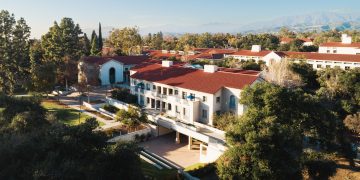Collaborative and Common Learning: Learn and Grow with Your Peers
Whether you live with a roommate or not, college is all about getting involved and getting to know others.
One of the key elements of any collegiate experience is honing your skills to become a successful member of society upon graduation. Our increasingly diverse world demands that we be interconnected in dynamic and relevant ways, and institutions that prize this aspect of the collegiate experience are setting their graduates up for success. While there are a number of ways to promote and support your personal and professional development, two proven practices that many colleges employ are collaborative and common learning. Regardless of your chosen career, you will need to work with others to achieve your goals and advance the desired outcomes of your employer. Opportunities for being involved in collaborative and common learning include jointly working on projects and research; sharing learning experiences around broad, integrated themes; enrolling in courses that are team taught by faculty from different disciplines; engaging with campus interdisciplinary themes that link curricular and co-curricular experiences; completing common readings across college levels (e.g. freshman reading); and attending guest speaker series’ that are combined with individual reflection and group discussions.
Collaborative Assignments and Projects
Increasingly popular at colleges and universities today, collaborative assignments and projects often mirror the real world of work and life beyond college. Whether you work in healthcare, business, education, the sciences, or some other field, you are sure to find you and your fellow employees frequently organized in teams and expected to work successfully within those teams. Collaborative problem-solving, diverse viewpoints, and different modes of thinking contribute to students’ development of:
- richer solutions to problems,
- multi-dimensional and hypothetical thinking,
- consensus-building skills, and
- effective teamwork.
Some universities require students to work on a community-based project that requires multiple angles to solve. For example, at Western Carolina University in North Carolina, this approach to learning has led to a partnership with the local community to respond to the major economic downturn by 1) having students who major in marketing work with the merchants in the town to create and implement a vibrant marketing plan; 2) employing communication student majors to develop public relations jingles for local radio and television broadcast; 3) allowing students majoring in computer information systems to develop an online application for the town that includes business locations, historic data, and calendar of events; 4) engaging students majoring in business to develop a business sustainability plan for various merchants in the town; and 5) hosting special events for the university community to participate in themed events at a discounted price. Faculty, staff, and administrators provided oversight and support for students in their work with the community.
Common Learning Experiences
Common learning experiences go hand-in-hand with collaborative assignments and projects; however, these experiences often take place university-wide or at the program level rather than in individual courses. An example of common intellectual learning experiences includes campus-wide themes where curricular and co-curricular opportunities are linked by a common topic. For example, at Western Carolina University each year, a committee of students, faculty, and staff propose and vote on a common these around which to entire the entire campus. Topics such as “the decade of the 1960’s,” “citizenship and civility,” “water,” “global poverty,” “economic inequality,” “North Carolina—our state, our time,” and “Africa: more than a continent” have been considered and/or adopted at WCU. Students learn by completing common readings across their general studies, attending speaker sessions, engaging in community service, viewing historic and art exhibits, and enrolling in specific courses that focus on the theme.
As a more specific example of a campus theme, WCU most recently selected the theme “Africa—more than a continent” and had a two-year (2015-17) focus on the cultures, diversity, political structures, foods, religions, arts, geography and geology, business, histories, music, hospitality, education, and demographics of the continent. Faculty and students could travel to Africa to study (through courses in anthropology, sociology, and criminal justice), conduct exchanges for professional development (like the partnership between Botswana and WCU’s department of Communication Sciences and Disorders), perform musically (in ensembles like the brass quintet), and conduct service-learning projects. The university’s dining division even participated in the campus theme by hosting several days’ worth of menus to highlight the cuisines of various African countries and cultures. The campus community experimented with Moroccan spiced whitefish, African peanut soup, East African eggplant stew, and West African Jollof rice. Students, staff, and faculty were afforded opportunities to discuss global issues in an African context while learning about the continent and its diverse countries and cultures. See Africa.wcu.edu for additional information on WCU’s campus theme.
Common intellectual learning experiences promote learning by A) helping students to see the world as a connected entity; B) providing common language to foster communication and understanding of various topics; C) fostering student camaraderie and campus engagement; and D) offering faculty and staff new and innovative ways to enhance teaching and learning.
However you define success in college, let a part of that definition be to involve yourself in the unique and innovative ways that universities are helping to shape you for a world beyond your campus.



